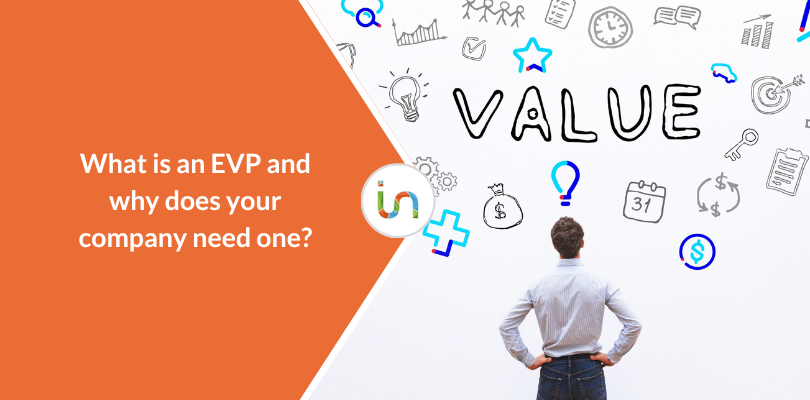
What is an Employee Value Proposition and why does your company need one?
In the world of sales, and in the business world in general, a value proposition is the set of products and services that represent value for a specific customer segment, or to put it in marketing jargon for a very specific buyer persona.
In fact, it answers one question above all: “Why should this type of customer choose my product/service and cascade my company as well?”.
Fundamental questions that we try to address with the strategic analysis to be done before designing any product or service and not vice versa (as some people mistakenly do) and which helps, once the answer has been given, to identify the right channels for the value proposition to reach the type of customer we had imagined.
To think that this has little to do with the HR world is wrong, we have said it many times, we repeat: the recruiter, nowadays, given the increasingly strategic function he has within the organisation, is often asked to think like a marketer.
It is no coincidence that we speak of recruiting marketing as well as marketing recruiting. Borrowing certain tools from marketing management can therefore be important in your employer branding strategy, to attract talent, in particular passive talent but not only, and at the same time can serve to outline certain aspects of your company organisation. As well as to make an all-round reflection on the direction it has taken and the value it can give to its internal people and/or external customers.
Therefore, starting with the value proposition, HR must always consider making an Employee Value Proposition, or EVP for short.
Let us see in this article what it is, what it is for, how best to make it, and finally some examples from large companies.
What is an employee value proposition
If we want to give an immediate and straightforward definition, an EVP is nothing more than the work experience perceived by employees within the company but also by potential candidates that is evaluated on the basis of the characteristics of the company, its brand identity, corporate culture and the relationship it has with its people.
Wanting to go into even more detail we rely on the words of Brett Minchigton, Employer Brand Strategist, who in 2005 defined an EVP as the set of associations and offers that an organisation provides in exchange for skills, capabilities and experience that the employee, in turn, brings to the organisation.
Organisations generally think of the Employee Value Proposition when they need to attract candidates; like a magnet, they try to create some coherence between employer branding and employee experience management. Instead, it is an approach, a methodology that, like marketing, must be developed upstream. An approach that must be employee-centred and aligned with other corporate strategies. An EVP has to come before the eventual platform to attract candidates because it has to be unique, relevant and compelling and is basically what differentiates one organisation from another. We could still say, to be more succinct that ‘The EVP is that unique set of offers and values that positively influences candidate personas‘.
It should therefore not be detached from the world of marketing management, far from it. If in marketing management, it is essential to identify the mission and vision of the company and the goals it sets itself, to define the corporate values that then lead to the spread of the corporate culture, EVP is linked to these but moves within the organisation.
Values are communicated to the outside world, EVP is instead, in the words of Helen Handflied Jones and Beth Axelrod, 2001 authors of the book The War of Talent (ed. Micheals) “the sum total of everything that people experience and receive as part of their working relationship with a company: intrinsic satisfaction with the job, the environment, leadership, colleagues, pay and more. It is what the company does to meet the needs, expectations, and even dreams of employees”. And we add: all this value must be transmitted, proposed, to those who want to become part of this world.
It also has a dual direction, as we have partly hinted at: EVP is the value that the organisation gives, but it is also what is expected of the employees, the way in which they can contribute to strengthen what the company gives. After all, and it is right to remember this, the organisation is not a stand-alone entity, but is made up of people and what each of them gives or does not give.
An ideal EVP should differentiate your organisation from the competition, allowing you to attract new talent and keep the best employees with you.
According to the Corporate Leadership Council, in order to recruit employees, a company with an EVP that is deemed insufficient must offer 21% higher pay premiums than organisations with an attractive value proposition. To create it, you need to understand the needs of current and potential employees. Only then will you have the information you need to attract, engage, retain and develop new talent, as well as to identify your company’s weaknesses.

Why an EVP is good for your company
To answer this question, you only have to go across the ocean for a moment and think of various companies such as Facebook, Google, Apple and others in Silicon Valley. Try asking a young person if they would like to go and work in one of these, they would definitely say yes, this is because these organisations have managed to convey their values through the fact that you can work anywhere, that there are cafeterias and gyms inside their premises, gyms, lots of flexibility and more.
These companies have clearly understood what an EVP is and have made it their flagship. What has been said so far may already make us realise the importance of an EVP, but let’s go even deeper by identifying four reasons out of all of them:
It is the foundation of your employer branding
What it means. That regardless of whether you have one or not, you still have one. Let us explain: you may not design the EVP, but the fact that your organisation exists, that it has corporate values and employees, already implies that there is a way in which it is perceived externally. It is the consequence, in fact, of all the actions you take to recruit or attract talent, the sum of other actions you take on social media, for example, what you post on your website.
Therefore, instead of having fragmented pieces, perhaps disconnected from each other, it is better to first think of an EVP and then work out how it aligns with what your prospect is looking for. It will be a formalised strategy that will guide employer branding efforts and prevent the opposite from happening. And that will avoid what is called the mismatch between job demand and supply.
It can improve recruitment but also retention
We have partly said it: people today are looking for more than just a great salary and benefits. They are looking for a job that makes them feel good, a company that leaves a mark with its culture, they are looking for a mission statement and one that does everything to achieve it. More and more research says so, which path analyst Daniel Pink has collected in his book ‘Drive’, in which he reminds us that the economic aspect is not the only way to engage candidates. This is also supported by Linkedin’s 2016 Talent Trends Report, which shows that only 29% of respondents left their jobs due to unsatisfactory compensation and benefits. That’s why, if perhaps your organisation doesn’t have as many resources or is a startup, focusing on an EVP can make all the difference in both attracting candidates and retaining those inside, making them fall in love with the environment and the value you offer.
It saves you money
And this is not only when you have to make a business proposition to a candidate, but also to those who are already inside the company. Poorly motivated employees, as shown by research by Gallup (which has been conducting employee retention studies since 2001), can be an exorbitant cost, and there are quite a few of them around the world: 85% seem to have no engaegment towards the company. Aiming at an EVP therefore means engaging employees and also having an immediate return in productivity. We often talk about happiness at work and a well-designed EVP can help create it.
It helps you differentiate your organisation
We have also said this to some extent, but you can say it again: in a world where jobs are certainly not scarce, it is not easy to stand out. The market is crowded and therefore those looking need to understand why that is the right offer. An EVP helps differentiate you from others, makes the talent understand why they should choose your company, even before they meet you. Then during the interview, it will be crucial to deliver on these promises, but if there is a strategy behind it, it will not be difficult.
How to make a good EPV: some tips
Define your candidate persona
It is crucial to think about what is the ideal candidate you are trying to attract, hire and place within the company. Therefore list all the characteristics, skills and what they should have.
Also, pay attention not only to what you are looking for in a person, but also how he or she might fit into the company culture. Having done this, try to understand what you could offer this type of candidate, starting with his or her needs – what kind of environment they are looking for, what career opportunities, what salary range they expect, etc.. – and how you might respond to these needs.
Think about what your company can provide in the search and selection phase
This will help you outline your value proposition but equally important is that you can ask questions directly to current employees trying to understand what you currently offer them, what they value most, what other ways you could motivate them, etc. While outlining your EVP as you go along, also consider passive candidates who might be just as ideal, but who are not only actively looking for a job, but may not accept a better offer with an attractive value proposition.
Another important thing: you should segment and customise your EVP as much as possible according to your audience. Let’s take an example: are you looking for a person with 20 years of experience? Then consider that this person will probably be a parent so in your EVP, if any, highlight childcare services.
In all this, ATS software can help you in a few seconds to find what you are looking for, to cross-reference certain aspects of the candidates, to see what their candidate experience was like and to have an immediate insight into how the search and selection process ended.
Three ingredients for writing your EVP
Having said that, in the very act of writing, you have to convince yourself of the power of persuasion, as if you were marketing something. Therefore, remember to stimulate interest in three things:
- the mission of your company
- the culture
- the career development of employees
By mission we mean not so much what is perhaps written on the website, but how your company helps customers, what it brings to the industry in which it operates or what it is creating that is different.
When you talk about your culture, think about what makes employees happy and involved. For example, an environment where you are constantly learning, growing, thriving, there is a clear career path, all things that will have already emerged from interviewing people. And this is closely related to career development.
Practical examples of EVP
And after all these words, let’s take a look at some examples of successful EVPs.
Hubspot’s EVP
As you may know, Hubspot is an inbound marketing platform. As for its EVP, it claims to deal with family planning and is not just about words. For example, it includes the option – funded – for employees to be able to freeze their eggs, so they can choose when to grow their career and when to grow their family.
As they explain: “Offering people at Hubspot the freedom and flexibility to create their own work-life balance creates trust in our company, but it is also the right thing to do. That’s why flexibility is at the core of our benefits and culture, from family planning to financial planning”.

Google’s EVP
We have already talked about Google, but let us dwell for a moment on the fact that its EVP focuses on the fact that no one who goes to work for the American company can have any doubt that they will have a rewarding and fulfilling career inside.
As the company states, they are always looking for people who can offer new perspectives and life experiences to their teams. In the EVP it says: “if you are looking for a position that will enhance your curiosity, passion and desire to learn, if you are looking for colleagues who are great thinkers and eager to take on new challenges as a team, you are a future Googler”.
Not bad, right?

The EVP of Shopify
Shopify is a Canadian multinational e-commerce company with an attached platform for online and retail shops, which also allows those who want to to set up their own shop. In its EVP, it focuses precisely on its mission, i.e. how it can help future customers (which we mentioned above).
Here is his EVP: “We are Shopify. Our mission is to make commerce better for everyone, but we are not the workplace for everyone. We thrive on change, operate on trust, and harness the diverse perspectives of the people on our team in everything we do. We solve problems at a rapid pace. In short, we work hard”.

These are just a few of the EVPs we have selected, now it is time to create the one that suits your company.
